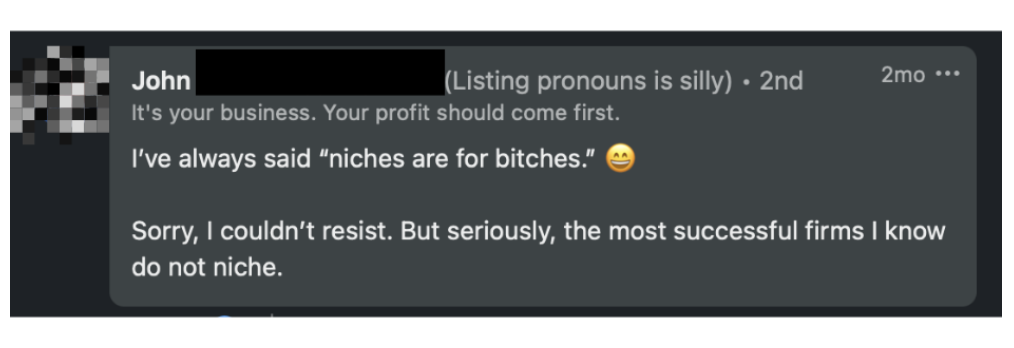
THE 5 MINUTE FRACTIONAL CFO
041: Should Your Firm Niche?
Apr 21, 2023Subscribe to the Newsletter
Join 4,000+ readers of The 5 Minute Fractional CFO newsletter and learn how to start, scale or optimize your Fractional CFO services.
5 BIG Benefits of Niching Your Fractional CFO Firm
Read time: 4:39 minutes
I wrote a LinkedIn post recently about niching as a fractional CFO.
Here's what one commenter had to say:

I'm always curious how people define "successful".
Does that mean:
• The firms with the most revenue?
• The firms with the highest margins?
• The firms where employees are happiest?
• The firms that have the biggest impact for the clients?
Always ask yourself those questions when someone talks about how "successful" people do things. The answer matters.
But I digress and I disagree with the commenter's position.
In fact, I 💯 agree with Alex Hormozi about the importance of niching 👇
In this book, "$100M Offers: How to Make Offers So Good People Feel Stupid Saying No", Alex stresses the importance of niching dozens of times.
If you don't know who Alex is, he's a business builder and investor - whose net worth has surpassed the 9-figure mark. Much of his success has been predicated on picking a niche and learning it inside and out.
He goes so far as to say that if you don't pick a niche, he'll be forced to niche slap you!
I trust Hormozi's advice here more than the guy who slid into my comments.
👉 Today, I'm going to share 5 reasons why I think you should strongly consider niching down.
(If, for no other reason, because I don't want you to get niche slapped by Alex Hormozi. He's a big guy.)
Benefit 1. Become the Industry Expert Your Fractional CFO Clients Need
When you focus on a specific niche, you'll develop deep expertise in that industry or type of business.
Your clients will appreciate the specialized knowledge you bring to the table. And this basically makes you an indispensable partner - in good times and in bad.
By staying on top of industry trends and challenges, you'll be better equipped to provide valuable insights and strategies to help your clients succeed.
Benefit 2. Attract and Retain High-Quality Clients
In my experience, this is the lowest hanging fruit and the one that yields that fastest results.
Why?
Niching down makes your marketing more targeted and effective.
Example 1️⃣:
We provide fractional CFO services for pre-seed SaaS companies.
Ah yes, very clear.
The audience you want to serve will immediately know if you are for them or not.
Example 2️⃣:
We provide fractional CFO services for companies.
Hmm, not so clear.
Interestingly, the audience you want to serve - and other audiences as well - are likely to skip right over you. They assume you're made for someone else.
When you go broad and try to speak to everyone, you end up speaking to no one.
Plus, when you niche, you're able to hit their specific pain points, needs, and jargon. This enables you to speak THEIR language which makes you more credible.
And closing becomes significantly easier. 💪
Benefit 3. Build a Powerful Network
Focusing on a specific niche enables you to create a strong network within that industry or business community. By attending industry events, engaging in online forums, and connecting with other professionals, you'll establish yourself as a trusted resource.
I can't stress enough how powerful this can be!
When your target audience sees you everywhere, you quickly build street cred in that market.
You're at their annual industry event.
You're chatting with the industry experts on LinkedIn.
You're making guest appearances on their industry's podcasts.
All of a sudden, people start to assume YOU are the CFO they never knew they always needed.
Plus referrals get easier:
This powerful network will result in more referrals and word-of-mouth marketing, as people within your niche will recommend you to others facing similar challenges.
Benefit 4. Streamline Your Processes
It took me entirely too long to realize how important this is.
Think about it...
If you're serving 8 different industries...
That might mean that you're working in 8 different industry-specific platforms...
Which means you have to LEARN 8 different platforms...
Which means that you have to document 8 different processes...
Which means you have to train your team on all of that...
Which means you have to be on the look out for updates to 8 platforms...
You see where I'm going with this.
Specializing in a particular niche allows you to optimize your processes and systems for the clients you serve. This results in increased efficiency and better client outcomes.
Benefit 5. Command Premium Pricing
This is my favoritest.
As an expert in a niche, you can charge premium rates for your services.
Period.
Why?
Because clients assume you're an expert in THEIR world and not another generalist.
And the best clients want the best on their team.
And the best clients are willing to pay for that.
Your clients will be more than willing to pay a premium for the specialized knowledge and expertise you bring to the table.
And as you continue to grow your reputation within your niche, the fly wheel continues.
You'll be able to attract even more high-paying clients, further elevating your firm.
Look 👀
I'm not saying you HAVE to niche to be "successful".
I AM saying that there are a lot of benefits that come along with niching. I also think there are some non-obvious considerations for niching that you should be aware of (I cover those HERE). If you're struggling to scale the way you want to, it's worth visiting the topic.
Your coach,
Michael King

